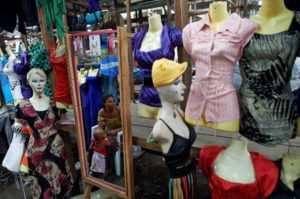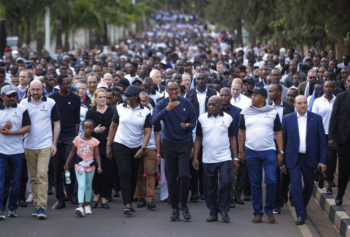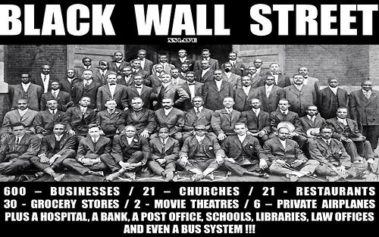
Photo by Thomas Lohnes/Getty Images
Damned if they do, damned if they don’t. When it comes to Rwanda’s ban on the importation of secondhand clothing, this futile sentiment appears to best describe the East African nation’s current dilemma. Consistent with the East African Community Summit’s agenda of 2016, Rwanda moved to phase out shipments of recycled clothing sent from the United States and other Western nations as a way of developing and sustaining its own sputtering textile industry. Failing to do so, consistent with this line of thinking, would have kept the landlocked nation dependent upon foreigners for the very clothing on its citizens’ backs.
This move has put the country at odds with the United States given the UN-reported $151 million the East African Community (EAC) generates annually by importing secondhand clothing from the West. More importantly, for Rwandans, thousands of local vendors and traders whose daily earnings come from reselling such products are experiencing a crippling drop in revenue.
“It’s a bad thing for local markets and vendors because there are thousands upon thousands of people whose livelihoods are impacted by the ban,” said Claude Gatebuke, executive director of the African Great Lakes Action Network, which supports peace, justice and prosperity in the region. The Rwandan organizer and activist survived the country’s four-year civil war and infamous 1994 genocide. “Once the shipments get on the ground, these thousands of vendors and their families survive based on that income,” explained Gatebuke. “Without a replacement, there is going to be a lot more people plunged into poverty and unable to support their families. And there are people who have done this for generations.”
Rwanda’s controversial president, Paul Kagame, a longtime ally of the United States, has taken a stay-the-course approach to what has been cast as a no-win scenario. “This is the choice we find that we have to make,” Kagame stated in June 2017. “As far as I am concerned, making the choice is simple, we might suffer consequences. Even when confronted with difficult choices, there is always a way.”
But Gatebuke questions whose way that is, given the monopolization of major industries by Kagame’s ruling party, the Rwandan Patriotic Front (RPF). “Because 90 percent or more of the business is owned by the party in power, one of the wealthiest parties in the world, they’re basically closing markets so they can monopolize them for themselves,” stressed Gatebuke, noting how “the common person is squeezed as the government-sponsored business venture flourishes.” The RPF’s commercial investment arm has long dominated all major industries in Rwanda in what The Financial Times labeled “the largest quasi-private business venture in the country,” one crowding out competitors and enjoying favored status for government contracts. Given the administration’s support for the domestic production of new clothing going forward, a process alienating both local vendors and consumers due to high production costs and pricing, Gatebuke characterized it as the ruling party’s way of “getting rid of the small vendors and thousands of self-employed individuals to create a market, or leave it open for just their specified producers.”
Many are already feeling the effects. “To do business in new clothes is very expensive, too expensive for me,” lamented Rutayisire Ibrahim in a recent interview with The Guardian. The Rwandan vendor peddles his declining wares to feed his family of six at Biryogo market in the capital city of Kigali. “But I don’t make enough money selling used clothes anymore,” said Ibrahim, noting “it’s complicated now. I don’t know what I will do.”
While valuable to some, such used clothing is initially given away for free. Do-gooders in Western countries commonly donate clothing items to charities, not realizing that many of these surplus items are then channeled to EAC countries for a profit. These charities partner with for-profit thrift chains like Value Village to sort, grade and resell the donations through their retail stores. Slightly damaged items or those not appropriate for retail are then sold to wholesalers who regularly ship and sell them overseas to vendors in foreign countries like Rwanda.
It wasn’t always this way, given textile industries in Eastern African nations once flourished, producing garments for thriving markets both domestically and abroad. However, this changed in the 1980s upon the adoption of the Western-dominated trade policies of the World Bank and the International Monetary Fund that flooded African economies with cheap imports at the expense of local factories and vendors.
Accordingly, the institution of the EAC ban was an attempt to boost domestic clothes manufacturing and establish Rwanda and its East African neighbors — Burundi, Tanzania, Kenya, South Sudan and Uganda — as less dependent on foreign economic influences. The EAC plans to phase out the importation of secondhand clothes and shoes from the West by 2019.
The West has taken the move as a threat and, in turn, issued some of its own. Last June, the Office of the United States Trade Representative initiated an out-of-cycle review of the eligibility of Rwanda, Tanzania and Uganda to receive benefits under the African Growth and Opportunity Act (AGOA). Under AGOA, member countries can receive such trade perks as duty-free access to the American market if they meet certain statutory eligibility requirements like stability, the establishment of market-based economies, and the elimination of barriers to U.S. trade and investment. A decision is pending on the review, which was brought on by a petition filed by the Secondary Materials and Recycled Textiles Association (SMART) in response to the EAC ban. SMART, which represents U.S.-based used-clothing companies, has claimed the ban “directly contradicts requirements that AGOA beneficiaries work towards eliminating barriers to United States trade and investment and promote economic policies to reduce poverty.” The petitioner further noted that recent tariff increases by EAC nations are extreme and amount to a de facto ban on secondhand clothes even without the implementation of a full ban. A SMART survey of its members found that over 94 percent of respondents feel a full EAC ban would bring about a 25 to 75 percent reduction of revenues.
The thinly veiled warning has had an impact. Africa’s largest apparel exporter within the EAC, Kenya, has since backpedaled on its prior commitment to the ban under pressure from the United States. In 2016, the country exported $341 million worth of new apparel to America, an amount it wishes to increase annually. Kenya was no longer subject to the AGOA-related review once it signed a $1.2 million deal with U.S. lobbying firm Sonoran Policy Group, a company with ties to Donald Trump.
But Rwanda still faces the possibility of sanctions and being kicked out of AGOA. “It’s amazing,” proclaimed Gatebuke, noting the United States’ lengthy and ongoing support of the Kagame regime despite a long list of human rights atrocities in his own country and the neighboring Congo. “Of all the things that the U.S. should sanction Rwanda for, this is the one they choose.”
Nonetheless, Rwanda has not buckled in its backing of the ban. And through media and advertising, the Kagame administration has advanced EAC themes aimed at making it a source of national pride, labeling Western secondhand clothing as unsanitary, dependent and imperialistic.
While acknowledging it may be all of the above, Gatebuke ultimately clarified the ban doesn’t benefit the masses of struggling Rwandan citizens and vendors nor the local families and markets they serve.
“If they were more sincere, they would have a transition period for these vendors to figure out what to do with some type of government assistance in the meantime for lost revenue,” insisted Gatebuke. “But there’s just no real concern for the citizens, especially those who survive off of the secondhand clothing industry.”


